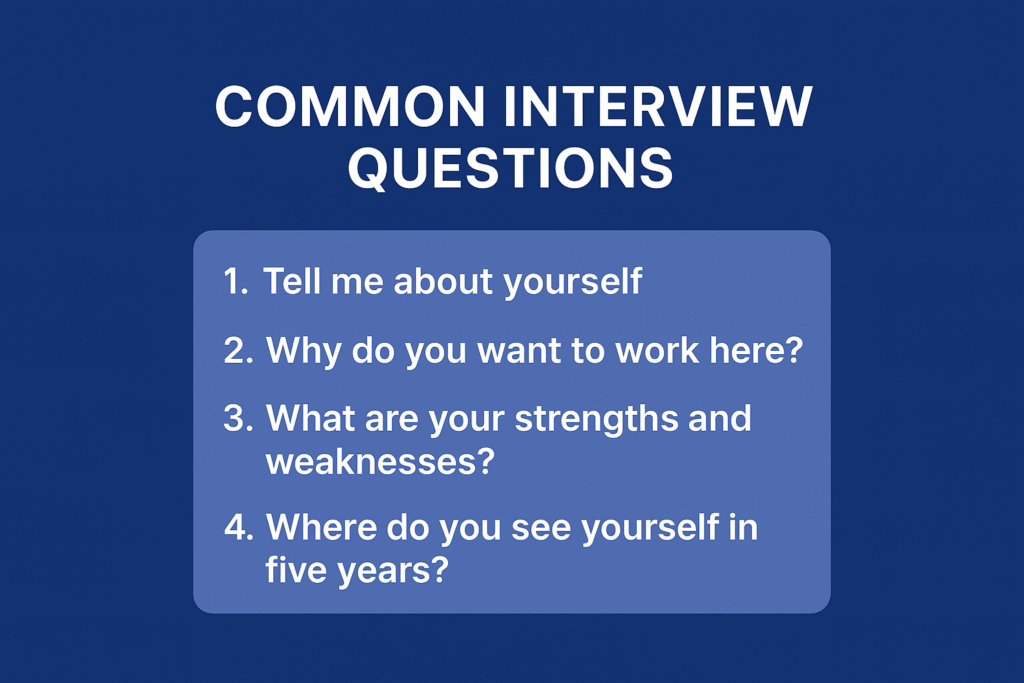Common Interview Questions and How to Answer Them
Introduction
Interviews can be nerve-wracking, especially when you’re unsure of the questions you might face. While every company and role is different, certain common interview questions are asked across industries. Preparing for these questions in advance not only boosts your confidence but also helps you deliver structured, impactful responses.
In this post, we’ll walk through some of the most common interview questions, why recruiters ask them, and how you can craft strong answers that set you apart.

1. Tell me about yourself
This is often the first question in an interview. Recruiters use it to understand your background and assess how you introduce yourself.
How to answer:
- Keep it professional, not personal.
- Provide a short summary of your career journey.
- Highlight key skills and achievements relevant to the role.
Example:
“I have three years of experience in customer service and administration, where I developed strong problem-solving and communication skills. In my last role, I helped reduce customer complaints by 20% by improving our support process. I’m excited to bring my passion for service and efficiency to this role.”
2. Why do you want to work here?
This question reveals your motivation and whether you’ve researched the company.
How to answer:
- Mention what you admire about the company (culture, values, growth, reputation).
- Link your career goals to the role.
Example:
“I admire how your company invests in employee growth and innovation. I want to contribute my skills in client management while also learning from a forward-thinking team that values excellence.”
3. What are your strengths and weaknesses?
Employers want to see self-awareness and honesty.
How to answer strengths:
- Focus on skills relevant to the role.
- Provide examples of how you’ve applied them.
How to answer weaknesses:
- Pick a real but minor weakness.
- Show what you’re doing to improve.
Example:
“My strength is adaptability. I can quickly adjust to changing priorities without losing focus on results. My weakness is public speaking, but I’ve been improving by volunteering to lead team presentations.”
4. Where do you see yourself in five years?
This tests your ambition and whether your goals align with the company’s vision.
How to answer:
- Avoid vague or overly ambitious answers.
- Focus on professional growth within the industry.
Example:
“In five years, I see myself advancing into a leadership role where I can guide a team, contribute to strategic goals, and continue developing my expertise in customer success.”
5. Why should we hire you?
This is your chance to sell yourself confidently.
How to answer:
- Summarize your experience, skills, and unique value.
- Show enthusiasm for the role.
Example:
“You should hire me because I bring a proven track record of improving customer satisfaction and team efficiency. My combination of technical skills and a customer-first mindset makes me an excellent fit for this position.”
Bonus: Behavioral Questions
Employers often ask behavioral questions such as:
- “Tell me about a time you resolved a conflict.”
- “Describe a situation where you met a tight deadline.”
How to answer:
Use the STAR method (Situation, Task, Action, Result) to structure your response.
Final Thoughts
Preparing for common interview questions gives you a clear advantage. Instead of memorizing answers, focus on creating a framework that highlights your skills, achievements, and alignment with the company. With practice, you’ll deliver confident, compelling responses that make you a strong candidate.
